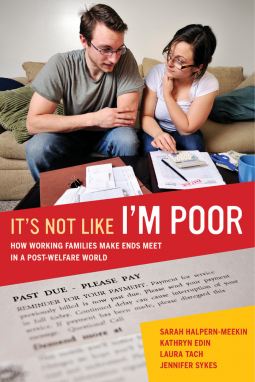Please wait... This may take a moment.
It's Not Like I'm Poor
How Working Families Make Ends Meet in a Post-Welfare World
by Sarah Halpern-Meekin; Kathryn Edin; Laura Tach; Jennifer Sykes
This title was previously available on NetGalley and is now archived.
Pub Date
Jan 14 2015
| Archive Date
Jun 01 2015
Description
The world of welfare has changed radically. As the poor trade welfare checks for low-wage jobs, their low earnings qualify them for a hefty check come tax time—a combination of the earned income tax credit and other refunds. For many working parents this one check is like hitting the lottery, offering several months’ wages as well as the hope of investing in a better future. Drawing on interviews with 115 families, the authors look at how parents plan to use this annual cash windfall to build up savings, go back to school, and send their kids to college. However, these dreams of upward mobility are often dashed by the difficulty of trying to get by on meager wages. In accessible and engaging prose, It’s Not Like I’m Poor examines the costs and benefits of the new work-based safety net, suggesting ways to augment its strengths so that more of the working poor can realize the promise of a middle-class life.
The world of welfare has changed radically. As the poor trade welfare checks for low-wage jobs, their low earnings qualify them for a hefty check come tax time—a combination of the earned income...
Description
The world of welfare has changed radically. As the poor trade welfare checks for low-wage jobs, their low earnings qualify them for a hefty check come tax time—a combination of the earned income tax credit and other refunds. For many working parents this one check is like hitting the lottery, offering several months’ wages as well as the hope of investing in a better future. Drawing on interviews with 115 families, the authors look at how parents plan to use this annual cash windfall to build up savings, go back to school, and send their kids to college. However, these dreams of upward mobility are often dashed by the difficulty of trying to get by on meager wages. In accessible and engaging prose, It’s Not Like I’m Poor examines the costs and benefits of the new work-based safety net, suggesting ways to augment its strengths so that more of the working poor can realize the promise of a middle-class life.
Advance Praise
"Humanizes the working poor in an unforgettable way."
—The Kansas City Star
“Halpern-Meekin, Edin, Tach, and Sykes take the question of how poor
parents make ends meet for them and their children into the twenty-first
century. This superb volume uses the best of mixed-methods research to
gain insight into how low-income working-poor family life actually is
lived in America today. It is the best book I have read on this
important topic in the past ten years.”
—Timothy M. Smeeding, Arts
and Sciences Distinguished Professor of Public Affairs and Economics,
Robert M. La Follette School of Public Affairs, University of
Wisconsin—Madison
“A rare invitation into the lives of struggling
Americans, where we are offered a remarkably penetrating analysis of
the trials and tribulations facing the working poor as they juggle
persistent financial as well as behavioral challenges. Indispensable
reading for anyone trying to understand what makes some
poverty-alleviation policies work better than others.”
—Eldar Shafir,
William Stuart Tod Professor of Psychology and Public Affairs,
Princeton University, and coauthor of Scarcity: Why Having Too Little
Means So Much
"Humanizes the working poor in an unforgettable way."
—The Kansas City Star
“Halpern-Meekin, Edin, Tach, and Sykes take the question of how poor parents make ends meet for them and their children...
Advance Praise
"Humanizes the working poor in an unforgettable way."
—The Kansas City Star
“Halpern-Meekin, Edin, Tach, and Sykes take the question of how poor
parents make ends meet for them and their children into the twenty-first
century. This superb volume uses the best of mixed-methods research to
gain insight into how low-income working-poor family life actually is
lived in America today. It is the best book I have read on this
important topic in the past ten years.”
—Timothy M. Smeeding, Arts
and Sciences Distinguished Professor of Public Affairs and Economics,
Robert M. La Follette School of Public Affairs, University of
Wisconsin—Madison
“A rare invitation into the lives of struggling
Americans, where we are offered a remarkably penetrating analysis of
the trials and tribulations facing the working poor as they juggle
persistent financial as well as behavioral challenges. Indispensable
reading for anyone trying to understand what makes some
poverty-alleviation policies work better than others.”
—Eldar Shafir,
William Stuart Tod Professor of Psychology and Public Affairs,
Princeton University, and coauthor of Scarcity: Why Having Too Little
Means So Much
Marketing Plan
No Marketing Info Available
No Marketing Info Available
Available Editions
| EDITION |
Other Format |
| ISBN |
9780520275355 |
| PRICE |
$29.95 (USD)
|
Additional Information
Available Editions
| EDITION |
Other Format |
| ISBN |
9780520275355 |
| PRICE |
$29.95 (USD)
|
Average rating from 2 members
Readers who liked this book also liked:









